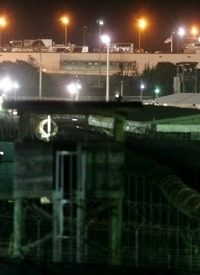
Colonel Lawrence Wilkerson, who was Chief of Staff for Secretary of State Colin Powell, has charged in a sworn affidavit that top officials of the Bush administration — including Secretary of Defense Donald Rumsfeld, Vice President Dick Cheney and President Bush himself — knowingly left innocent detainees to languish in prison to avoid political fallout. “Their view was that innocent people languishing in Guantánamo for years was justified by the broader war on terror and the capture of the small number of terrorists who were responsible for the September 11 attacks, or other acts of terrorism,” Colonel Wilkerson stated.
Wilkerson, a longtime critic of the Bush detainee process, wrote the affidavit in support of the lawsuit by former Guantanamo detainee Adel Hassan Hamad, who was innocent. The Bush administration repatriated Hamad to Sudan without charges on December 12, 2007 after five years of detention. Wilkerson calls Hamad one of the “victims of incompetent battlefield vetting.”
Wilkerson wrote that “it became apparent to me as early as August 2002, and probably earlier to other State Department personnel who were focused on these issues, that many of the prisoners detained at Guantánamo had been taken into custody without regard to whether they were truly enemy combatants, or in fact whether many of them were enemies at all.” Wilkerson notes that many of the detainees were handed over to the United States for simple greed. Bounty hunters were promised as much as 150 million Afghanis (about $5,000, more than five times the per capita annual income in Afghanistan) after the Afghan invasion for handing over al-Qaeda suspects to the United States. “Such practices meant that the likelihood was high that some of the Guantánamo detainees had been turned in to U.S. forces in order to settle local scores, for tribal reasons, or just as a method of making money,” Wilkerson wrote. “I recall conversations with serving military officers at the time, who told me that many detainees were turned over for the wrong reasons, particularly for bounties and other incentives.”
A particular focus of scorn for Wilkerson is “Secretary of Defense Rumsfeld, who just refused to let detainees go,” and “Vice President Richard B. Cheney, whose position could be summed up as ‘the end justifies the means,’ and who had absolutely no concern that the vast majority of Guantánamo detainees were innocent, or that there was a lack of any useable evidence for the great majority of them. If hundreds of innocent individuals had to suffer in order to detain a handful of hardcore terrorists, so be it. That seemed to be the philosophy that ruled in the Vice President’s Office.”
The decisions went all the way to the top, Wilkerson says, testifying that his meetings with Colin Powell revealed that President Bush “was involved in all of the Guantánamo decision making.” Cheney’s philosophy could be accurately summed up as the inversion of Sir William Blackstone’s dictum, “It is better that ten guilty persons escape than one innocent suffer.” Blackstone, the British Enlightenment-era author and common-law scholar, was a key influence on the U.S. independence movement and the U.S. Constitution.
Wilkerson wrote that because most of the detainees had been turned over by bounty hunters or foreign governments, “a separate but related problem was that often absolutely no evidence relating to the detainee was turned over, so there was no real method of knowing why the prisoner had been detained in the first place.” After looking into the circumstances of the arrest of Guantanamo detainees, Wilkinson wrote, “by late August 2002, I found that of the initial 742 detainees that had arrived at Guantánamo, the majority of them had never seen a U.S. soldier in the process of their initial detention and their captivity had not been subjected to any meaningful review.” As a result, “my investigation into the Abu Gbraib detentions revealed that some 50-60% of those imprisoned in Abu Ghraib were probably innocent.”
Wilkerson’s personal experience is backed up by the academic research of Seton Hall Law School Professor Mark Denbeaux and his investigative team, whose analysis of U.S. government public data on the circumstances of the arrest of Guantanamo detainees found that 93 percent had not been apprehended by U.S. or coalition forces on the Afghanistan or Iraqi battlefields. Most had been handed over by the Pakistani government, bounty hunters, or the local warlords associated with the U.S.-allied Northern Alliance.
Wilkerson’s investigation and Denbeaux’s research flatly contradicts public claims by President Bush regarding Guantanamo detainees: “These are people picked up off the battlefield in Afghanistan. They weren’t wearing uniforms, they weren’t state sponsored, but they were there to kill.” Vice President Cheney and Secretary of Defense Rumsfeld made almost identical, but more specific (and therefore, more factually inaccurate), statements.
But the facts have stated otherwise. Wilkerson’s revelations that all of the top leadership of the Bush administration knew they were detaining innocents and were stubbornly refusing to release them because it would make them look bad politically can only be termed troubling. Thus far, Colin Powell has refused to comment on Wilkerson’s accusations.
Almost as disturbing as the accusation that the President, Vice President, and Secretary of Defense would knowingly imprison (and torture) people they knew to be innocent is the blackout among U.S.-based media of Wilkerson’s allegations. Thus far, Americans who want to hear the allegations from the mainstream media have to go across the Atlantic Ocean to read the Times of London’s account of the lawsuit.
Photo of Gunatanamo: AP Images



